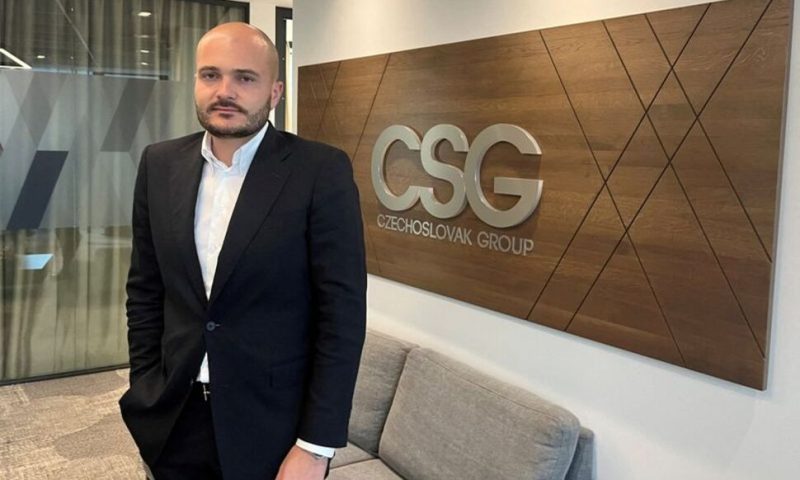PRAGUE – Michal Strnad, who a decade ago became head of CSG, a family defence business, is closing in on buying U.S. ammunitions maker Kinetic Group that will transform a company that started by buying tanks for scrap into a key player in the global arms market.
But first Strnad, the 31-year old Czech, owner and chairman of the Czechoslovak Group (CSG) — a large supplier to Ukraine — needs to fend off a rival offer for Kinetic parent Vista Outdoor to get control of around 20 percent of the West’s small ammunitions market and nearly double its revenue from last year’s 1.7 billion euros.
“We are a long-term strategic investor that wants to take it private to build it and grow it and invest in new capacity and technology,” Strnad told Reuters in an interview on Friday. “We will not just come and shake the company for the money and try to squeeze it.”
The privately-held company, which employs more than 10,000 workers at 37 sites in Europe and the United States, has made a $1.91 billion all-cash offer for Kinetic Group, formerly known as the Sporting Products, which includes its ammunition production business.
Vista Outdoor has agreed to the CSG bid, which needs clearance from shareholders in May, and approval from Committee on Foreign Investment in the United States.
The company has also received a revised unsolicited $3 billion all-cash bid deal from investment firm MNC capital, after rejecting a previous offer from the firm.
Strnad, whose net worth more than doubled last year to $4.4 billion according to Forbes, said his company’s offer makes sense for a privately-held company like his not answerable to shareholders that has the financial wherewithal to utilise and expand capacity and withstand what he called “peaks and valleys” in the industry.
Taken together with the 2022 acquisition 70% of Italy’s small-calibre ammunition maker Fiocchi Munizioni, the deal would make CSG the biggest player in that market in the world outside China and Russia, Strnad said.
“There is big space to improve efficiency and invest into automation, new production lines and machines,” said Strnad, who sees the deal giving the Czech company entry into the market for government contracts in the United States and elsewhere.
FROM SCRAP TO GLOBAL PLAYER
Strnad’s father Jaroslav started the business in the 1990s after the Cold War, buying Soviet-era military equipment, initially meant for scrapping. He then turned to refurbishing it, and slowly growing the company from a small outfit with family members.
The father stepped away in 2013 and handed CSG leadership to then 21-year old Strnad, who started working at the company in high school and has overseen its growth into a major producer in the European Union and exporter to over 50 markets including many fellow NATO member states.
“I finished school when I was 18… at 1 p.m. I got in the car and went to the factory to work,” said Strnad whose first job at the company was working in a storage warehouse with his grandmother during summer holidays when he was just 13.
The fast growth under Strnad accelerated in 2022 following Russia’s invasion of Ukraine because the company was able to supply refurbished Soviet-era tanks as well as new equipment, and quickly ramped up shell production.
Core earnings more than doubled in 2023 to 439 million euros and CSG forecast continued strong demand for its heavy military equipment and large-caliber ammunition as countries ramp up defence spending amid the war in Ukraine.
Strnad said the company plans to tap its war chest for some additional acquisitions, though nothing the scale of Vista.
“We would like to grow in all of our divisions in the group,” said Strnad who said targets in the defence industry had big premiums these days. “In each group there are small or bigger acquisitions. Some are vertical while some are buying competitors.”
ARTILLERY BACKLOG
Where Strnad said the company has seen huge growth due to Ukraine is the production of large calibre ammunition, where its annual capacity has increased 10-fold to more than 500,000 rounds of tank and various artillery rounds, which is a significant part of current European capacity.
“We have invested hundreds of millions of euros since the start of the war in capacity,” Strnad said.
He said the company now had a backlog of artillery orders for six years and was investing further into new capacity at its plants in Slovakia, Spain and Serbia.
Strnad said CSG also planned to restart and idle gun powder and nitrocellulose production line at an Italian factory, in cooperation with the Italian government, to address what he called a huge bottleneck for European ammunition makers.
The company, which also makes howitzers, armoured vehicles or multiple rocket launchers sees promising markets Asia, the Middle East and Africa but also Ukraine where it has been exploring joint ventures with Ukrainian companies.
While the war makes it difficult to set up shop now, Strnad believes that the help and good will his company and the Czechs have received for supplying weapons and equipment to Ukraine can translate into an important foothold in the nation’s future defence industry.
“In the long term or mid term we would like to localize and help them with their own defence industry,” Strnad said.

